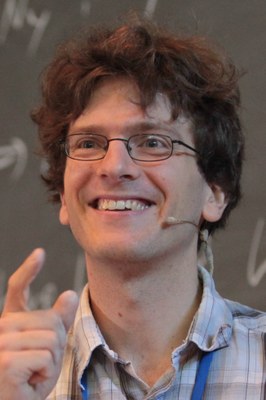Program
Lecture Series
The lecture series will be given by
 |
Jonas PetersUniversity of Copenhagen
|
In the field of causality we want to understand how a system reacts under interventions (e.g. in gene knock-out experiments). These questions go beyond statistical dependences and can therefore not be answered by standard regression or classification techniques. In this part of the workshop you will learn about the interesting problem of causal inference and recent developments in the field. No prior knowledge about causality is required.
- Part 1: We introduce structural causal models and formalize interventional distributions. We define causal effects and show how to compute them if the causal structure is known.
- Part 2: We present three ideas that can be used to infer causal structure from data: (1) finding (conditional) independences in the data, (2) restricting structural equation models and (3) exploiting the fact that causal models remain invariant in different environments.
- Part 3: We show how causal concepts could be used in more classical statistical and machine learning problems.
- Slides
 |
Vanessa DidelezUniversity of Bremen |
In this 2nd half of the course we will focus on questions of how to estimate causal effects of exposures or treatment-type variables on some outcome from observational data or imperfect trials; many examples will be taken from epidemiology. Misconceptions and fallacies relating to standard statistical methods will be discussed and the basic ideas of alternative approaches introduced.
- Part 1: Basic concepts and methods: types of causal parameters, selection of sufficient adjustment set, time-varying confounding, regression adjustment (and its fallacies) / standardization, propensity score methods, inverse probability weighting and marginal structural models.
- Part 2: Causal mediation analysis and its relation to linear structural equation models: controlled/natural causal effects vs. Baron-Kenny approach, path-specific effects, parametric versus non-parametric identification, methods and software for estimation.
- Part 3: Relaxing the "no-unmeasured-confounding" assumption: sensitivity analyses and instrumental variables (two-stage least squares, examples with partial compliance and Mendelian randomization).
- Slides, Exercises
Schedule
| Sun, Mar 3 | Mon, Mar 4 | Tue, Mar 5 | Wed, Mar 6 | Thu, Mar 7 | |
|
Breakfast 8:00-9:00 |
|||||
| 9.00-10:30 |
J. Peters Lecture 1 |
V. Didelez Lecture 1 |
V. Didelez Lecture 2 |
Departure |
|
| Break | |||||
| 11:00-12:30 |
J. Peters Lecture 2 |
J. Peters Lecture 3 |
V. Didelez Lecture 3 |
||
|
Lunch 12:30-14:00 |
|||||
| 14:00-15:00 |
Arrival |
J. Peters Exercises |
Excursion |
V. Didelez Exercises |
|
| Break | |||||
| 15:30-16:30 |
J. Peters Exercises |
V. Didelez Exercises |
|||
| 16:30-18:00 |
J. Peters Discussion |
V. Didelez Discussion |
|||
|
Dinner 18:00-19:00 |
